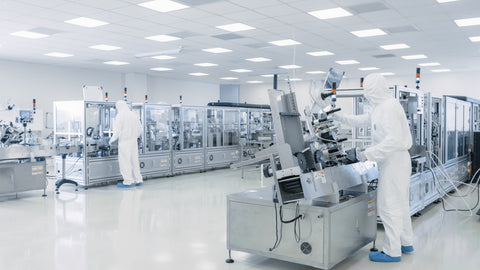Pharmaceutical and Sterile compounding plays a vital role in customizing medications to meet specific patient needs. A key part of this process involves choosing between sterile and non-sterile compounding methods— each with distinct product requirements and regulatory guidelines. Understanding these differences is crucial, especially when it comes to filtration, which ensures product safety and efficacy.
What is Compounding?
Compounding is the process of combining, mixing, or altering ingredients to create a medication tailored to the needs of an individual patient. It’s essential in scenarios where commercially available drugs are not suitable— due to dosage requirements, allergies, or the need for a specific formulation. There are two main types of compounding: sterile and non-sterile. This blog describes what each are, their advantages, disadvantages, and common compounding products.
Sterile Compounding
Sterile compounding refers to the preparation of medications that are free from microorganisms like Brevundimonas diminuta Bacteria. These products are typically administered via injection, infusion, or directly into sterile body cavities, which is why contamination of the compound can pose a serious risk. It’s important to note that sterile compounding is required for injectables, pharmacy & hospital use, surgical centers, and long-term care.
Advantages of Sterile Compounding
- Ensures patient safety by eliminating microbial contamination.
- Suitable for injectable medications, ophthalmic solutions, and IV infusions.
Limitations of Sterile Compounding
- Requires ISO-classified cleanroom environments.
- Involves strict adherence to USP <797> guidelines.
- Higher operational and compliance costs.
Common Sterile Compounding Products
- IV admixtures
- Ophthalmic solutions
- Injectable medications
- Parenteral nutrition solutions
These compounded sterile products must pass through sterile filtration systems to ensure complete removal of microbial contaminants. 0.2 microns filters, whether in single or dual layer filters, is the only acceptable micron level for sterilizing-grade filtration.
Note: While 0.22µm filters are commonly mentioned, the slight difference of 0.02µm can be extreme.
Non-Sterile Compounding Products
Non-sterile compounding is used for medications administered via routes that do not require sterility, typically meant for external use or administration through the digestive system. While the risk of infection is lower, product quality and consistency are still essential.
Advantages of Non-Sterile Compounding
- Lower equipment and facility requirements.
- Ideal for oral suspensions, creams, and capsules.
- Greater cost efficiency and ease of implementation.
Limitations of Non-Sterile Compounding
- Not suitable for high-risk patients or sterile applications.
- Requires compliance with USP <795> for safety and consistency.
Common Non-Sterile Compounding Products
- Oral syrups and suspensions
- Topical ointments and gels
- Suppositories
- Capsules and powders
While sterility isn’t required, filtration is still used to remove particulates and ensure uniformity, especially for oral and topical formulations.
Filtration Uses in Pharmaceutical Compounding
Filtration is a cornerstone of both sterile and non-sterile compounding practices, serving different goals depending on the application. In sterile compounding, filters are used to sterilize solutions by removing bacteria. In non-sterile compounding, filtration helps remove particulate matter or undissolved materials to improve consistency and clarity.
Some common filtration products used in compounding include membrane filters for sterile filtration, ideal for ensuring microbial retention in sensitive preparations. Depth filters serve as effective pre-filters, capturing larger particulates to extend the life of downstream filters. For ready-to-use options with minimal setup, use disc filters for small volume applications, and capsule filters for medium-sized volume applications. Choosing the appropriate filter type from our comprehensive selection helps ensure compounded medications consistently meet critical safety and efficacy standards.
Looking to ensure your filtration processes meet industry standards? Take our Filter Selection Quiz to find the right filter that suits your needs.


